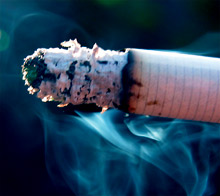
The adverse effects of cigarette smoking is known for long and it is considered the prime risk factor for cardiac problems, but a new study has revealed that nicotine itself can add to the disease process.
A research conducted at Brown University in Providence, R.I., discovered that nicotine, a constituent of cigarette smoke, can contribute to the disease process by altering cell structure in a way that facilitate migration and invasion of the smooth muscle cells lining blood vessels.
In fact, invading cells can change structures called podosomes, and it may result in further degradation of vessel integrity.
Ultimately, this cellular migration and invasion process increases the formation of vessel-clogging fatty deposits called plaque - one of the important signs of heart and blood vessel disease.
If the further researches on this topic confirm that nicotine itself facilitates vessel damage by altering podosomes than the health benefits of helping people quit smoking through smokeless nicotine delivery agents such as gum or patches can be questioned.
"The finding that nicotine is as effective as cigarette smoke in enhancing cellular structural changes, and breakdown of scaffold proteins by vascular smooth muscle cells, suggests that replacing cigarette smoking by nicotine treatment may have limited beneficial effects on atherosclerosis,” explained lead researcher Chi-Ming Hai, professor of medical science in the department of molecular pharmacology, physiology, and biotechnology at Brown University.
Hai's research reflects on the multistep process of plaque formation, and says that a new powerful player, nicotine, may be involved.
As per study, the plaque formation process starts as a response to cellular injury, and develops to destructive and chronic inflammation of the vessel walls that attracts loads of white blood cells, further inflaming the vessels. This damage-causing swelling can be started by chemical insults from high blood sugar, modified low-density lipoproteins (LDL, the "bad cholesterol"), physical stress from high blood pressure, or chemical insult from tobacco smoke.
Now nicotine itself seems to change key structures in a way that prepares and increases the attack on smooth muscle lining the vessel wall.
Discovering a possible nicotine-posodome link in the invasion step of plaque formation process indicates a new way of intervening in the process: targeting the cell structures that are altered by nicotine and that facilitates invasion of the smooth muscle lining the wall of blood vessel. If a treatment could stop, slow, or reverse that step, it may check the plaque-production cycle.
Deposition of fatty substances in blood vessels starts as young as age 10 and develops over a person's lifetime. Heart disease results if the fatty deposits continue to grown and making vessel hard and causing vessel-clogging plaque. When plaque bursts, it can block blood flow, it checks supply of oxygen to heart or brain that results in heart attack or stroke.
The findings of the study will be presented at the 56th Annual Meeting of the Biophysical Society (BPS), held Feb. 25-29 in San Diego, Calif.
--With inputs from ANI
|
|
Read More: Ming Gadhera | Gorakhpur University | Agra University | Ayurvedic University | Bundelkhand University So | Mds University Ajmer Dtso | Daxini Society | Gujarat University | Azad Society | Chandkheda Society Area | Ambika Society Kalol | Kalol Society Area | Patel Society Area Tso Nad | Madanapalle Society Colony | S.v.medical College So | Theosophical Society Gdsso | B.supply | Manipur University | R.block | K.r.high School


Comments: